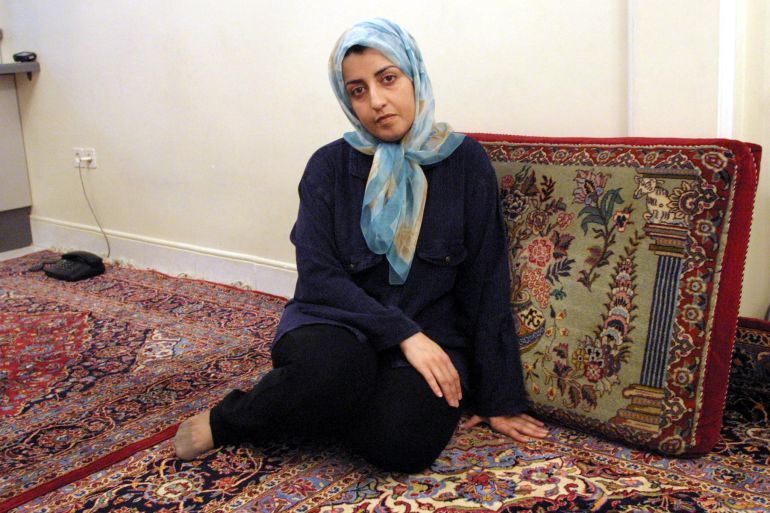 |
| Image Source: Al-Jazeera |
Concerned about his physical and mental health, Mohammadi's family say they hold the government responsible for his condition
Nobel Peace
Prize laureate Nargis Mohammadi has started a hunger strike against the ban on
medical care for her and other prisoners in her Iranian prison, as well as the
ban on women wearing the hijab in Iran, according to her family.
Veteran rights
activist Mohammadi, 51, who is currently incarcerated in Avon Prison in the
Iranian capital, Tehran, was awarded the Nobel Prize in October "for her
struggle against the oppression of women in Iran."
"Nargis
Mohammadi today informed her family through a message from Evan Jail that she
had started her hunger strike several hours ago. We are concerned about Nargis
Mohammadi's physical condition and health," her family said in a statement
on Monday.
In a post on X,
formerly known as Twitter, her family said she was eating only water, sugar and
salt, and had stopped taking her medication.
Mohammedans
refuse to wear the hijab under any circumstances, the head covering that has
been mandatory for women in public since shortly after Iran's 1979 Islamic
revolution.
Jail
authorities have responded by refusing to transfer Mohammadi, who is suffering
from heart and lung problems, to a hospital outside Avon for treatment.
His family said
he was in "urgent" need of medical treatment outside of prison.
"Nargis
went on hunger strike today to protest two things: the Islamic Republic's
policy of delaying and ignoring medical care for sick prisoners... [and] for
Iranian women," the statement said. 'Mandatory Hijab' policy," the
statement said.
"The Islamic
Republic is responsible for whatever happens to our beloved Nargis," it
added. "It's been a week now that they're refusing to give him the medical
attention he needs."
'Morally Unacceptable'
In a strong
statement of support for Mohammadi, the head of Norway's Nobel committee,
Barrett Rees-Andersen, said the body was "deeply concerned" about the
health of the 2023 laureate.
He said that
the requirement of women prisoners to wear hijab for admission to the hospital
is inhumane and morally unacceptable.
The start of
Nargis Mohammadi's hunger strike shows the seriousness of the situation. The
Norwegian Nobel Committee urges the Iranian authorities to provide Nargis
Mohammadi and other female prisoners with whatever medical assistance they
require.
Meanwhile, the
group promoting freedom of expression PEN International said it was
"deeply concerned" about Mohammadi and "holds the Iranian
authorities fully responsible for putting his life in serious danger".
"Nargis
Mohammadi should not be in jail in the first place," it said, adding that
Iran should "immediately" release her and "immediately transfer
her to a hospital for medical treatment".
'Means of Coercion'
First arrested
22 years ago, Mohammadi has spent much of the past two decades in and out of
prison campaigning for human rights in Iran.
He has been
imprisoned since November 2021 and has not seen his children, who now live in
France, for eight years.
Mohammadi's
Nobel prize comes after months of protests across Iran over the September 2022
death in custody of 22-year-old Mahsa Amini, who was allegedly arrested for
violating Iran's strict dress code for women. He was arrested on the charge.
From prison,
Mohammadi also expressed outrage over what he described as the
"murder" of teenager Ermita Giravand, who was hit on the head without
a hijab in the Tehran metro.
While
Giravand's parents appeared in official media footage saying that a blood
pressure problem, a fall or perhaps both contributed to their daughter's
injury, activists alleged that she may not have been given a headscarf by
ethics police. Pushed or assaulted for wearing, which is strongly denied.
She died in
October after being in a coma for a Month.
In a message of
gratitude for the prize, which was read by her daughter and posted on the Nobel
website, Mohammadi called the compulsory hijab "a means of control and
repression imposed on society and on which the continuation of this
authoritarian religious and Survival. The system depends".
(Courtesy: Al-Jazeera)












0 Comments